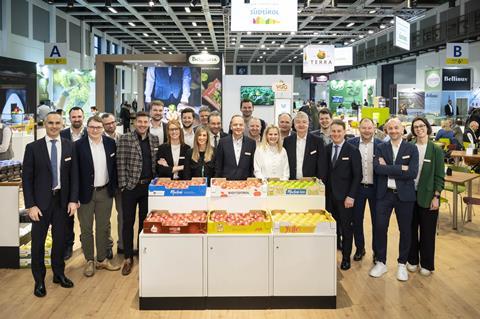With a broader range of product types, an array of trademarked brands, and a series of targeted marketing programmes, the business of selling apples has changed dramatically in recent years
Italy’s two largest apple exporters, Vip and Vog, have a tricky task on their hands. But it’s a challenge more or less entirely of their own making, and one they are very happy to take on. Selling apples in 2024 is remarkably different for these South Tyrolean suppliers compared with even a decade ago.
In the past few years, both have made significant investments in licensed varieties. Each of these trademarked apples has its own brand that must be managed, merchandised and marketed. As a result, the companies’ respective product portfolios have become far more complicated, their marketing plans more intricate.
And for a handful of those so-called club varieties – Cosmic Crisp, Envy, Kanzi, Yello – the two are joint licensees with a shared business objective. In some cases, they even work together on a coordinated promotional plan.
Cosmic Crisp is a standout example of how fast this trend is taking shape. Only just recently, the companies brought it to Europe and started to produce it under licence, after it was bred and planted widely in Washington State during the last decade.
Since then, their production has tripled to 14,000 tonnes this season, with more than 40,000 tonnes expected in 2025. Eventually, Italian-grown Cosmic Crisp should be available in Europe for 12 months of the year.

Varietal value
Why so many different brands? The aim is to present the international market with a range of potential eating experiences and thus meet as many different consumer preferences as possible. It’s also a move designed to extend the season further and for as long as possible.
Open-source varieties like Gala, Braeburn and Golden Delicious once dominated the offer. And although they remain larger in terms of volume, the club varieties now make up an increasingly large and commercially valuable proportion of the mix.
In the meantime, advances in breeding techniques and storage technology mean that the fruit’s shelf-life – especially for the newer proprietary varieties – is longer than it used to be.
Many in the Italian apple trade are wary of the risk of oversupply, but the policy of investment in more varieties appears to be working.
Both Vip and Vog are halfway through a notably longer Italian season that used to be supplemented more heavily from February onwards by imports from the Southern Hemisphere. For some exporters in places like New Zealand, new demand in Asia and the Middle East has made Europe a less vital target destination. But a Europe-wide trend towards production of higher-value, premium apples in the second half of the season has also changed the market landscape.
For Vip, its Gala will be on the market until the end of March but partially replaced by another non-licensed variety Pinova from the beginning of February. But it is club apple varieties like SweeTango which are having a more notable impact on sales growth, explains Vip’s commercial director Kurt Ratschiller.
“Once again, we were able to place the SweeTango summer apple very quickly in Italy and, for the first time, we reached important customers in Spain and Denmark,” he says. “Moreover, some new partners have already confirmed the inclusion of this club apple in their offer for the new season, which confirms the positive response of final consumers.”
Virtuoso performances
Different types of apple require different methods of marketing. This season, the Cosmic Crisp campaign will invite people to experience “heavenly” sunset roadshows in cities across Italy, Germany and Spain, including Madrid, Barcelona, Munich, Cologne, Berlin, Milan, Rome and Naples.
The journey towards clubland has certainly prompted a dramatic change in strategic approach for Vog and Vip when it comes to their consumer marketing.
“In a scenario that embraces a large number of brands, consumer communication must be orchestral,” says Hannes Tauber, Vog’s marketing manager, who says he views the group’s apple marketing campaign as a symphony in which each product gets a chance to play a solo. “The individual brands link each specific product with its own values, lifestyles and consumer promises,” he adds.
Vog recently introduced Giga, a larger-than-average apple that lends itself to sharing in spring and summer. It also sells RedPop, a small and very sweet apple that has started to make a name for itself as a snack fruit in the UK and other markets.
“Every one of the new apples we’ve placed on the market in recent years has a precise identity and addresses a specific audience,” Tauber insists. “Our policy has been not to increase output but to focus on the value of the category, to engage with apple consumers and attract more people to join their number.”
The suppliers have also identified a need to help consumers understand the differences better. Part of Vog’s approach has been to show shoppers what it refers to as an ‘aroma wheel’ of tastes and flavours for each individual type. Vip, meanwhile, plans to publish an information brochure called Applepairing, which will tell consumers how six of its varieties can best be combined with other foods.

Golden age
This does not mean older varieties are left to fend for themselves, however. This year, Vip plans to focus part of its communication on Golden Delicious, the most widely grown apple in its home Val Venosta.
“In Italy and Spain, the two main markets for our Golden variety, we are organising Golden Weeks in selected retail chains,” reveals marketing manager Benjamin Laimer. “Besides receiving detailed information about the product, during these promotional weeks customers have the opportunity to immerse themselves in the flavour of Golden and rediscover a traditional variety in a new way.”
The greater complexity of their product range in recent years has meant better commercial prospects for South Tyrol’s apple marketers. Their sales teams have seen a positive impact on what they refer to as ‘destocking’, the process by which the sale of fruit harvested from late summer onwards, and then placed into storage, is carefully planned and executed from week to week as the season progresses. Market oversupply of those older, more commodities varieties seems a less likely scenario than it once was.
“While Royal Gala was the leading apple in the initial phase of sales, we are now experiencing good demand for all our varieties, because they each have their own consumers and market,” comments Vog sales manager Klaus Hölzl. “In Europe, we’re seeing positive conditions, with Italy and Spain responding well to the new varieties and the German market performing well.”
In emerging markets, this season has also started strongly, Hölzl says. “The Middle East continues to be our main market [outside Europe], although Central and South America are growing in spite of the challenges arising from the distances involved.”
Future prospects are also encouraging. “We’re expecting the market in the coming months to be good: as other fruit and vegetable products disappear, we will still be present with our high quality apples,” Mr Hölzl continues. “Then from May onwards it will depend on consumption trends and weather conditions, but in general we’re predicting that the situation will be under control.”
With so much variety and so many new opportunities, it’s fair to say that South Tyrol’s apple business has entered a golden age.




